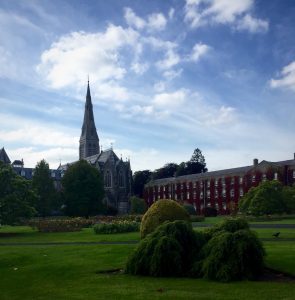Monday morning. Nine AM. I’m sitting for my first lecture.
Of course, it’s not just my first lecture. It’s the lecture.
The first sociology module I saw on Maynooth’s course offerings page that made me think, “Yeah. This is probably the one.”
“Marx on Ireland.”
A class designed to examine colonization as a social process and see Ireland as the prototype for English and American imperial conquests. A class that examines the writing styles of Marx and Engels, and looks at Marx’s framing of the Irish question via dialectical materialism (not just blaming the economy). A class where the pressures of nationalism, religion, racism, ethnicity, economy, politics, colonialism, feudalism, and the environment will be analyzed and contrasted with anti-colonial forms of resistance.
I was a little excited.
And everything was going great. I found the room on time, the professor was witty, the material was interesting, and we were somewhere between why feudalism sucks (more than capitalism) and how the colonization of India mirrors the colonization of Ireland when the professor says, “The Irish were living on the pedacial.”
Okay. What the hell is that.
I wrote “pedacial” at the corner of my notes, fully intending to google it later, but stuck on the horror of, “I’ve fulfilled the stupid American stereotype in under fifteen minutes of my first class.”
The professor said the word six more times before I finally realized potato.
He was saying potato. “The Irish were living on the potato.”
Accents were the last thing that I thought might trip me up while studying abroad. It’s Ireland, after all, and English is the most common language. As it turns out, there’s much more than just the accent.
Allusions to pop culture abound in many lectures (by the way it’s Thin Lizzy, not Tin Lizzy), along with references to geographical locations and roadways, and the names of people, events, and brands I’ve never heard of. And somehow the fundamental point of a lecture always seems to hinge on the example of the commercial for bananas that aired ten years ago on RTÉ One.
These events aren’t limited to classroom experiences, or even walking around Ireland. Maynooth boasts an international student population of about five hundred students from around the world, although most are European. And in any conversation I have with my Japanese flatmate, any lunch with German and Dutch friends, or drink with the students from Spain, we always hit a barrier. Whether it’s a word that doesn’t translate into English, or some cultural difference like whether or not you should shake hands or kiss, or how to use a fork and knife.
But the language and cultural barriers we come across don’t set the pace of our conversation, or limit the things we do or talk about. It’ll be something small that comes up in conversation, everyone has a laugh, and then you move on. Occasionally it will spark another conversation, but even for me, the constantly self-aware, self-conscious, and socially awkward, the little bumps really aren’t huge roadblocks.
Until you’re back to sitting in lectures and your first assignment is “tree” pages on someone you don’t know, from somewhere you’re not familiar with, doing something you never heard about. But I suppose that’s the point of it all.
